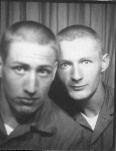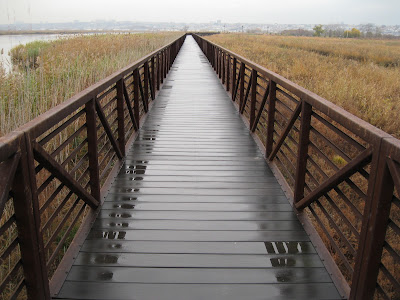Chapter 21: One more road to Denver
Just where Texas ended and New Mexico began, I don't recall, having lost interest in the signs after leaving Amarillo. I wanted to get the rest of the trip over and done with, so I could plan my next move, and the miles between me and L.A. seemed wasted to me, as if they had ceased to have any meaning in the overall context of my life.
I hadn’t realized just how far 1,000 miles was or two or three until I had traveled it by bus, not just the length of it, but the constant buzz of the air conditioning, the rumble of the tires on the uneven road, even sounds of other passengers – the snores, the coughs, the mumbling complaints, the whispers in the dark into dawn, bickering couples, outbreak of someone stirred out of nightmare.
Sleep – at least real sleep – was just not possible. I dozed, then jerked away at some bump in the road or some cough in the dark, and then struggled to slip back into semi-consciousness, at time, realizing that it was me that had cried out.
Everything constantly vibrated, worse when in my doze my head touched the window against which I could feel every crack in the highway the bus rolled over, my bones shaken at each impact.
Others around me suffered from the same inability to sleep, and after so many miles, they all had the bleary-eyed look of the walking dead, all of them put off the good moods from early in the trip, impatient as I was to get where we were going if only to stop the incessant hum of wheels.
Had I known what would later come about, I would have paid closer attention to the landscape, making mental notes about how to survive here. I did not presume I would ever return to his part of the world for any reason, carrying little for the few sights I did catch outside the window, shacks and abandoned cars, as prevalent in my time making the great trip west as the ruins of covered wagons and the bones of oxen must have seemed to the early pioneers.
Yet it was the same land both then and now, though instead of a single dirt track upon which the wagon wheels rolled, the bus sped along a very flat highway. We got to view the flat land on either side as if the film had been sped up and everything moved around us in fast motion, life and death in the desert going on simply more rapidly than my ancestors had found it.
Sunlight streamed across the distant horizon, revealing rises in the earth that I knew were mountains, but each seemed so far away, they had a dream-like quality the way clouds did, and I expected them to evaporate or get blown away from some great wind at any moment. Adding to this was the even more ethereal wetness that seemed to float on the road ahead of us, like some lake just beyond the bumper of the bus, yet when we reached the spot where the lake had been, the water had dried up.
One of the other passengers called it "a mirage," and I understood for the first time how early settlers had been fooled by it, tortured by its teasing, when each person verged on the edge of death from dehydration. We had no such problem as the hostess provided us with regular soft drinks, and yet the more I stared the more seduced I became by the illusion, and the more thankful I became when we reached a town.
Tucumcari sounded Indian to me, though no one on the bus near me could say just whether it was or what the name meant. From the glimpses we caught, it seemed a town full of motels, some of these called ranches, many with the images of tepees glowing in neon over their vacancy signs.
Then more miles passed and more of the same desperate landscape, of dust and distance, and the teasing water and teasing mountains, and the sameness inside the bus of people coughing or snoring or turning the stiff paper pages to books and magazines. At Santa Rosa, I was drawn to a cafe we passed with a sign advertising biscuits and gravy, and as the building shrank behind us, I could not get the idea out of my, tasting the food with my desperate imagination, as if the boredom of the landscape had made me desire anything of substance. I kept tasting the cinnamon apple pie the cafe had offered for dessert, knowing that no pie could have tasted nearly as sweet as my imagination made it.
As we neared Albuquerque some of this changed, a pale light hovering over the distant city, the clouds of pollution draining the landscape of its vividness. The buildings sagged along the roadside, old-fashioned gas stations popping up at first, only to be replaced by newer stations as we neared the city proper. Yet even when we came upon the city, it was hard to imagine it standing 5,300 feet above sea level, one of the many stops along the Santa Fe rail system. Some of the highway was under construction as old Route 66 vanished, segments reattached like old limbs to new bodies, highway interstates that seemed nowhere near as romantic as the old road from Chicago. Signs advertised the Cibola National Forest but not the prehistoric ruins of the ancient sky-city of Acoma. To the Southwest, the Mazano Mountains showed themselves, like a brown smudge.
The bus stopped here, giving us a rest, but I had caught glimpses of signs for highway 25 and Colorado. I hurried into the bus terminal where I acquired a map for the state, and another for the state of Colorado, following the road line up out of Albuquerque until it pierced Raton Pass, and pressed into the green body of Colorado. Switching maps, I soon discovered that this road, one upon which I nearly stood, went all the way to Denver in an un-diverted straight line, and I all I had to do was hop off the bus I was on and board a new one heading north.
For some reason, I resisted that move, and sat at the lunch counter sipping coffee despite the heat outside and the churning, antiquated air conditioner struggling to keep the bus station cool even in November. I stared at the map, followed it up again and again with my finger, then folded the maps away again, making up my mind then and there to continue on to Los Angeles.
Perhaps it was that dead man back in Cincinnati that bothered me, that man of mystery that even Bill Warton had noticed but could not explain, something on my scent from nearly the beginning, who others would follow, trying to sort out my trail, thinking that if I had not taken the northern route via Chicago to Denver, I would take the Southern route and slip up to Denver through the belly of Colorado. In my mind, I saw a host of police waiting at the station when the bus finally pulled into Denver, and my uncles standing to one side, pointing me out as I stepped off.
When the driver hooted the bus horn for us to re-board, I joined the others, leaving the maps on the counter as I left, sitting myself where I had sat for almost two days, staring out at the landscape of the city as we pulled out. We passed the Route 66 Diner on Central Avenue with its neon sign of red and blue, and the El Vado Motel beside it.
Downtown passed in a quick succession of relatively tall buildings, with outskirts made up of a string of low lying single and dual story buildings. Further out still odd metal towers poked their ugly heads up, spewing flame and smoke from the rows of oil refineries, black clouds of it pouring out into the distant desert and across the southern arm of Isleta Indian Reservation. By this time, the dread and temptation of going north had passed and I leaned back in my seat, closed my eyes and slept.



Comments
Post a Comment